English version click here
南京戦後の証拠記録
1. 戦争が終わった翌日の1937年12月14日正午から1938年1月までの間、南京周辺全てを撮影していた記録フィルム
2. ルイス・S・C・スマイス博士(金陵大学社会学教授)調査レポート「南京地区における戦争被害 1937年12月から1938年3月」
南京での死亡者数は最大2400人と記録されています。
「南京地区における戦争被害 1937年12月から1938年3月」調査レポート全文(PDF)
PDF 45ページ目 日別 死傷者数
3. NYタイムズ、シカゴ・トリビューンの記事 1938年1月4日
アメリカ管轄の難民区に潜んでいた元中国軍大佐とその部下たちは、ある晩に難民キャンプから少女達を暗闇へ引きずり出し、翌日日本兵がやったのだと非難。
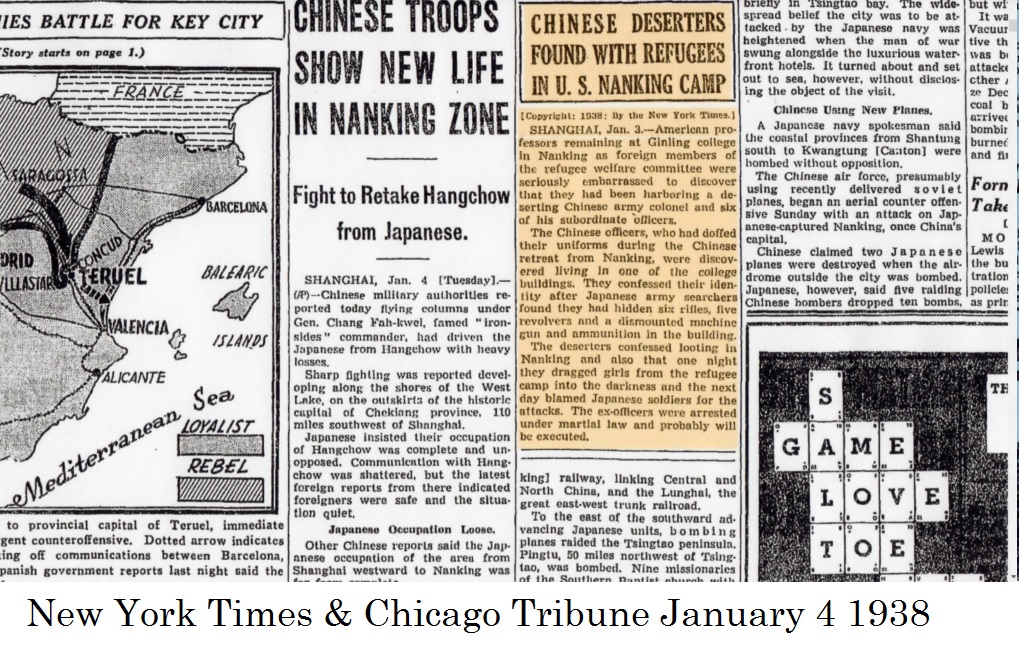
【アメリカの南京キャンプの避難民の中に中国人脱走兵が発見される】
1938年ニューヨークタイムズの著作権
上海1月3日
アメリカの教授達は南京にある金陵大学に残っていました。避難民の福祉厚生委員会の外国人メンバーはそこで脱走してきた中国軍人大佐や直属の部下6名をかくまっていたことに気づいて、真剣にうろたえました。
中国の将校は南京からの退却中に自分たちが着ていた制服を脱いで、なんと大学の建物内の一つに住んでいたのが発見されたのです。
日本兵の捜索隊が建物内に中国兵所有の6丁のライフルと5丁の拳銃、下ろした機関銃1丁、弾薬一個を発見すると、中国兵は自身の身分を自供しました。
脱走兵は南京で強奪したことも自供しました。そればかりかある晩に難民キャンプから少女達を暗闇へ引きずり出し、翌日日本兵がやったのだと非難したのです。
戒厳令の元、前将校達は捕らえられ、おそらく処刑されるでしょう。
これらの記録に “南京大屠殺=南京での皆殺し” を見つけられますか?
*資料は松尾一郎氏(日中問題研究家・南京事件専門家)から提供していただきました。更に詳しくは松尾氏のサイトをご覧ください。
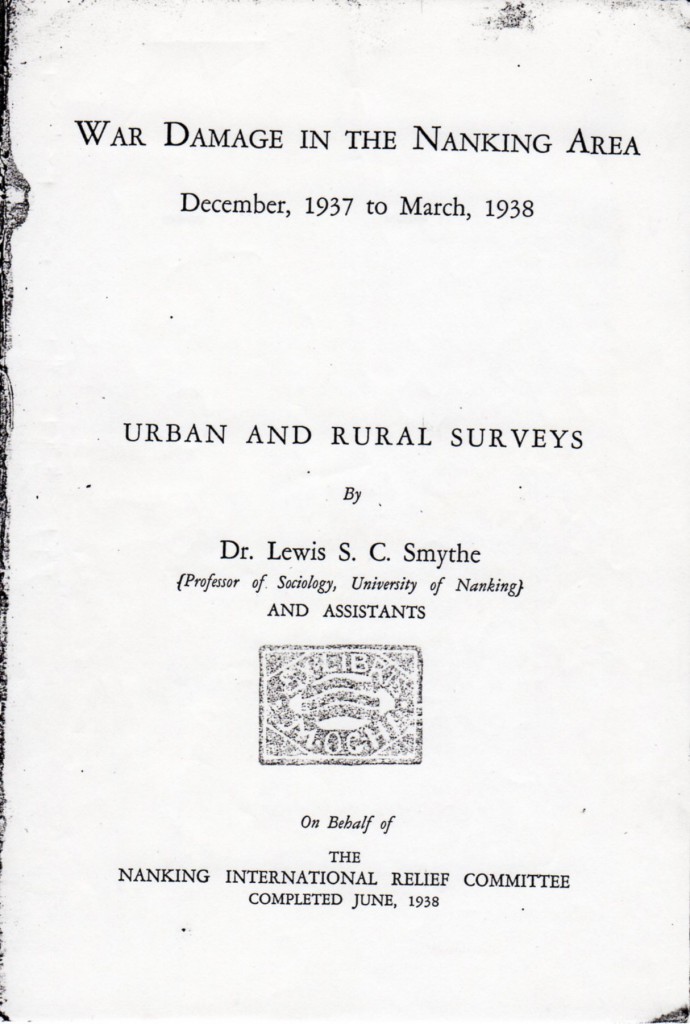
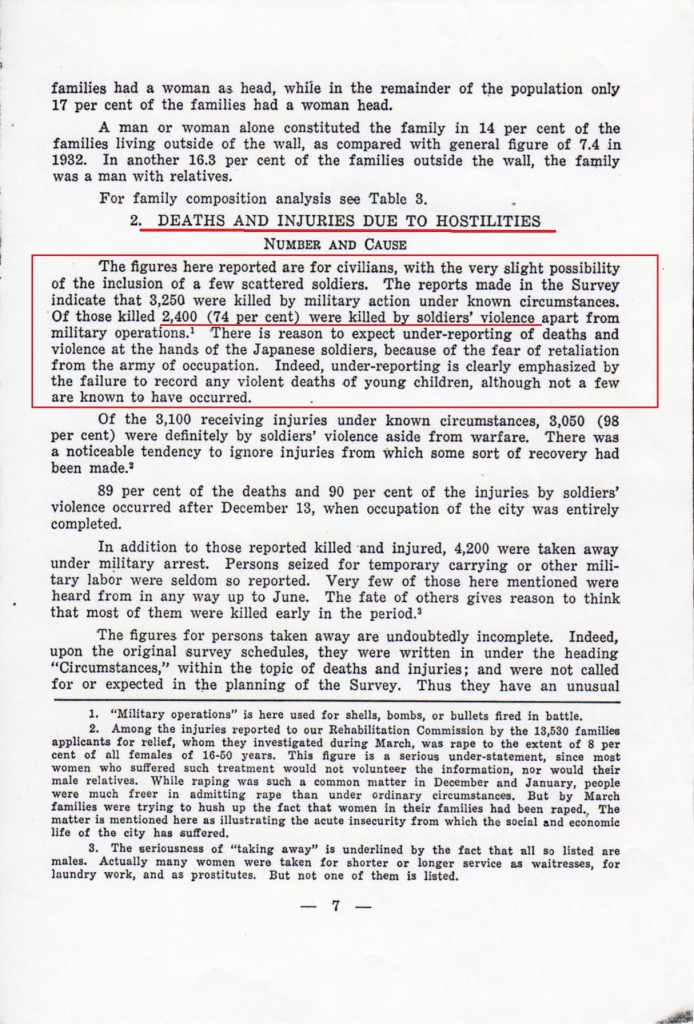
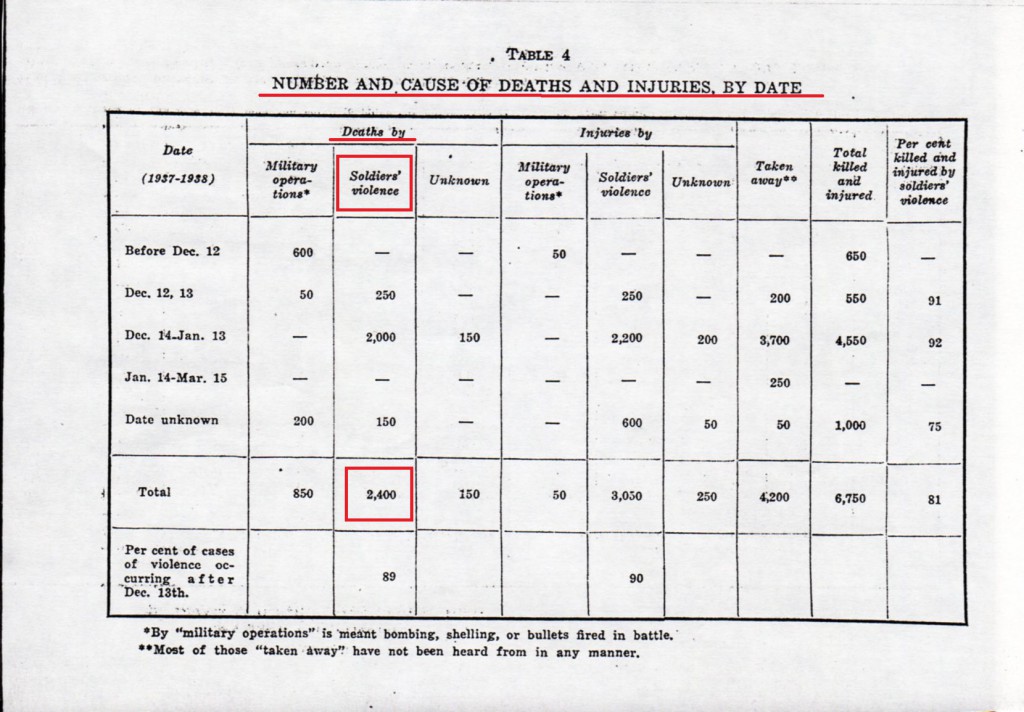
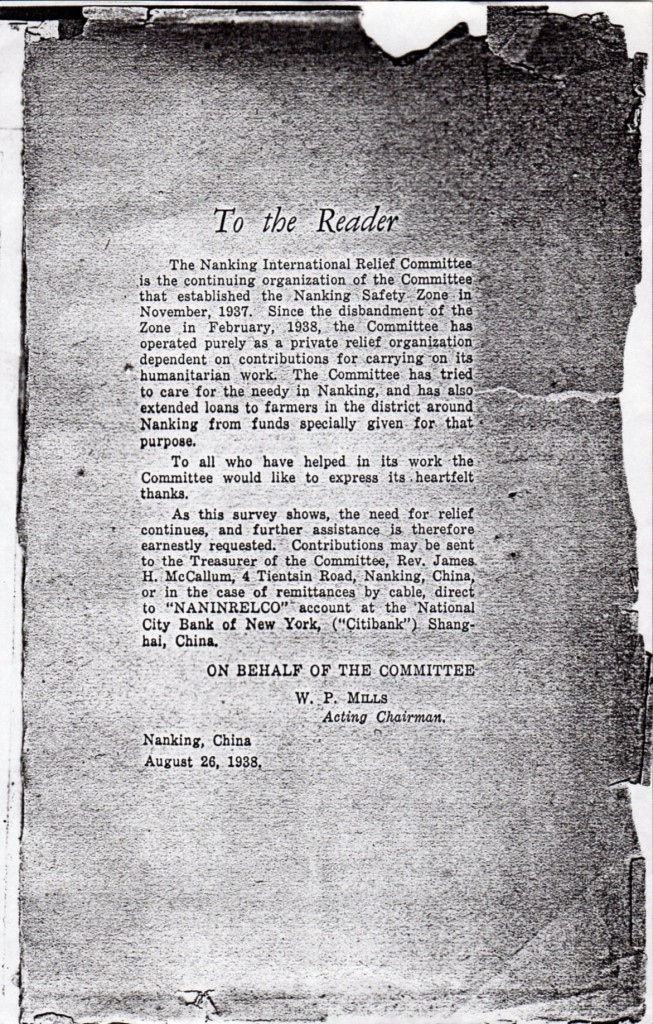
本日、州議員の関係者から返信が来ました。
——————————————————-
From: Harinder Malhi, MPP (Constituency Office)
Sent: Saturday, February 25, 2017 6:04 AM
To: ‘Ichiro Matsuo’
Subject: RE: Do you know these records and Documents after battle of Nanking?
Dear Ichiro Matsuo:
On behalf of MPP Harinder Malhi, thank you for taking the time to copy our office on your message. I will ensure it is brought to the Member’s attention.
With kind regards,
Barbara Tait, Special Assistant
Harinder Malhi, MPP Brampton Springdale
Constituency Office
905-495-8030
Ontairo 150 logo for auto-signature 2017
——————————————————————
[訳]
松尾一郎様
ハリンダー・ハルヒ州議員の為に、事務所へ貴方の主張(コピー)を送って頂いた事に感謝します。
職員に対して注意してくれたことに対し保障します。
敬具
APPENDIX I. NANKING MASSACRE BY CHIANG KAI-SHEK
附录 1 .蒋介石的南京大屠杀
THE NANKING MASSACRE EVENT
南京大屠杀事件
In order to understand fully how the Nanking Massacre event unfolded, we need to start our story from the Xian Mutiny of 1936.
为了充分了解南京大屠杀事件如何展开,我们需要从1936年的西安事变开始讲述我们的故事。
In the morning of December 12, 1936, Chiang Kai-shek was apprehended by the mutiny generals’ men while hiding behind some boulders.
1936年12月12日早晨,蒋介石躲在一些巨石后面被叛变将军的军队抓获。
This was the “Morning of Infamy” for Chiang. And for our Chiang and his American boss FDR alike, one Infamy must be replied by another Infamy.
这是蒋介石的“恶名之晨”。 而对于我们的蒋和他的美国老板罗斯福来说,一个“恶名”必须由另一个“恶名”来回报。
So, the morning of December 12, 1937 was the specified time the Commanding General Tang of Nanking was ordered by Chiang, in his final signed telegraph after two previous attempts, to leave Nanking for another “Morning of Infamy”.
于是,1937年12月12日早晨,是蒋介石下令规定的时间,南京总司令唐将军一定要撤出南京。在两次尝试之后,这是蒋总在他最后一次签署的电报中的命令,去迎接那另一个“恶名之晨”
Chiang was not always a stickler about dates. For example, one of the mutiny general, the one who helped him escaped from his capture, Chiang had the guy put under house arrest longer than anybody cared to remember.
蒋介石并不总是一个对日期坚持己见的人。 比如,一名帮助他逃离西安的叛变将军,蒋介石将那家伙软禁,长的没有人能记得有多久。
But the other one, the more die-hard mutiny general, got the whole family, including one infant, butchered with faces made unrecognizable by acid only hours before Mao’s men got there to rescue them.
但另外一个,更强杆的兵变将军,全家人招屠杀,包括一名婴儿,加上他们的脸都被酸化的无法识别。发生之后的几小时,毛泽东的人赶到了,也未能拯救他们。
And the Infamy in this case was that the victims all still thought Chiang was their friend.
在这一次,“恶名”性质是,那些受害者都还以为蒋介石是他们的朋友。
Also, never forget Chiang was a persistent person. And always remember: he only became more persistent if you try to change him. So, the Mutiny was a big mistake.
此外,也永远不要忘记,蒋是一个执着的人。 还永远要记住:如果你想改变他,他只会变得更加执着。 所以,这次叛变是犯了一个大错。
Now instead of just targeting the communists in China, Chiang went after all Chinese. That’s maybe why later he sensed a new lease on life in Taiwan, when he had his once-elusive enemies now all cornered in one spot — the Mainland China.
现在,蒋不只是仅仅针对中国的共产党人,而是所有中国人。 这也许就是为什么他可能感觉后来的台湾是他新生命的开始,当时曾经一度难以捉摸的敌人,现在都限制在一个地方 – 中国大陆。
In the Xian Mutiny, Chiang was forced under gun point to stop killing Chinese and start kill Japanese. Well, that definitely made him wanting to kill more Chinese and love Japanese even more.
在西安叛变中,蒋被迫在枪口威胁下停止杀中国人,并开始杀他爱的日本人。 那么,这绝对会让他更想杀中国人,也更爱日本人。
This is the key factor for anyone to understand Nanking Massacre, and all the other senseless happenings during Chiang’s rule.
这是任何人想理解南京大屠杀的关键因素,也是看穿蒋介石统治期间所有其他毫无伦理的事件。
One American Chinese girl named Iris Chang was a victim of not understanding this factor, but still with open bright eyes, wrote the a book about Nanking Massacre.
一位名叫张纯如的美藉华人女孩是一个不理解这个因素的受害者,但仍然,睁着明亮的眼睛,写了一本关于南京大屠杀的书。
And the Japanese rightwing is the current on-going victim. After a thorough research of WWII, they still have no tiniest clue as to who had been taking them for a wild ride and making them sounded like self-contradictory laughing stock to the outside world.
日本右翼而是这代当前的受害者。他们到今天还摸不着头脑谁耍了他们。在对二战进行彻底研究之后,他们仍然没有丝毫的线索谁把他们弄的让他们听起来,像自相矛盾的笑柄。
After China declared war against Japan by the agreement reached in Xian Mutiny, the first Battle of Shanghai was a shocker for Chiang, as well as the Japanese. Chiang was hoping the superior Japanese military would teach the over-eager Chinese a lesson.
在中国,通过在西安兵变所达成的协议,向日本宣战之后,上海的第一次战役震惊了蒋和日本。 蒋希望日本的优越军队能够给他手下那些过分渴望抗日的中国人一个狠狠的教训。
But instead, the Japanese suffered such a big loss, the central command in Tokyo basically decided to drop the inland expansion plan.
但相反的是,日本遭受了极大的损伤,东京的中央指挥部基本上决定放弃向中国内陆扩张计划。
That definitely would be a no-no for Chiang. He wanted to give Japan another chance at Nanking. So, he must guarantee the invading Japanese generals that the Nanking defense would be completely disabled when Japanese soldiers entered the city.
蒋介石绝对不能让他们这样做。 所以,他想再给日本一个机会–在南京。 所以,他必须保证日本在日军士兵进城时,他会完全拆除南京的防备。
This was why Chiang left no communication equipments with the Nanking troops and no aerial support for the artilleries. In addition, Chiang personally pulled General Tang out of his defense command right when Japan started its assault on Nanking.
这就是为什么蒋没有留下通讯设备给防守南京的军队,也没有给炮兵任何的空中支援。 此外,蒋介石在日本开始袭击南京时亲自将唐将军拉出他的防卫指挥部。
Today, the Japanese rightwing hardcore still maintains that there was no massacre in Nanking and the whole thing was all a fabrication. But nobody listen to their cry.
今天,日本右翼组织仍然认为南京没有屠杀事件,整件事情都是捏造的。 但没有人听他们的呼喊。
Why, all they really need to do is just show the true military records how easily they entered the city without any fighting, or rather, facing only retreating Chinese soldiers. Then people would automatically suspect of a fabrication on their own.
为什么呢?他们真正需要做的仅仅是展示真实的军事纪录,他们在没有任何对抗的情况下轻松进入城市,或者更确切地说,只面对逃亡的中国士兵。 然后人们自然会怀疑捏造。
But the Japanese couldn’t do that, because the bigger truth here was that “Chiang was on their side”. Anyway, at the time, they need to keep this horror of a bigger truth from Chiang’s boss, America.
但是日本人不能那样做,因为这里更大的真相是“蒋介石是站在他们一边的”。 无论如何,当时他们需要对他们的好朋友,蒋介石,的老板美国保密这个更大的恐怖真相。
America was happy with the Shanghai Battle. So, Chiang must capitalize on this momentum. He must show large casualty numbers, or simply fabricate some photographs that would damaging Japan’s image. He did both.
美国对上海之战感到满意。 所以,蒋必须充分利用这一势头。 他必须再展示大量的伤亡人数,或者干脆编造一些照片,将损害日本的形象。他两个都做到了。
Two large sources of casualties, all Chinese, came from General Tang’s do-or-die commitment at defending Nanking. First, he demolished all the vessels for escape to strengthen his troop’s determination in defending the city to the last man.
两大伤亡来源,都是中国人,来自唐将军对南京捍卫的不朽承诺。 首先,唐拆除了所有的逃生船只,以加强他的部队保卫城市到最后一个人的决心。
Second, he positioned two machine guns right over the narrow escape route to wipe out any notion of desertion.
其次,他将两把机枪放在狭窄的逃生路线上,以消除任何逃弃的想法。
So Chiang’s order to retreat made it the worst day in Tang’s life. This poor guy must have wished for a life time to gripe about what Chiang made him to do, especially after he warned Chiang that there would be a massacre, even just by his own people, if he retreated.
因此,蒋介石的撤退命令造成唐将军人生中最痛苦的一天。 这个倒霉的将军一定还希望能有一生的时间来抱怨蒋介石让他做了什么,尤其是在他已警告蒋介石会有一场大屠杀,甚至只是通过自己人杀自己人。那就是如果他撤退。
But little did Tang realized, it’s all in the Chiang’s fabrication plan. If only Chiang could also knock off Tang, nobody would ever be able to find out the truth. Ha, only dumb American generals would judge the genius Chiang was a nitwit.
但是唐有所不知,这一切都在蒋的捏造计划中。 如果只要蒋再可搞掉唐将军,那么谁也不可能发现真相。 哈,只有愚蠢的美国将军才会判断天才蒋介石是一个傻瓜。
So Chiang made sure Tang would not have the chance to gripe. He arrested Tang and executed Tang by a firing squad for desertion.
所以蒋要确定唐不会有机会去抱怨。 他逮捕了唐,并以一个逃兵罪行,处决了唐。
But in the footnote of the book, Rape of Nanking by Iris Chang, the readers are told that Tang was actually rescued by the Communists and lived to a ripe old age — to gripe. But the bashful Chinese government censored everything, except for the little they told Chang that’s in her book.
但在张纯如的南京大屠杀的书中,读者被告知,唐实际上被共产党人救出,并活到一个老大的年龄 – 去抱怨个够。 但是保守的中国政府封锁了一切,除了在张纯如书中的一些信息。
TWO HEROINES OF NANKING
南京的两位女英雄
A few words are in order to credit the two heroines in the Nanking Massacre event. The first is Iris Chang, the author of “Rape of Nanking”.
南京大屠杀事件的公布于世界应归功于两位女英雄。首先是张纯如“南京暴行”的作者。
For a good analytical reader, Chang’s book has already convicted Chaing as the fabricator of Nanking Massacre with the information the Chinese communists frevealed to Chang.
对于一个会分析的读者来说,张的书已经可在中国共产党向她透露的信息中判定南京大屠杀为蒋所捏造的。
It’s almost a matter of time, she herself would have realized, or by some convincing argument from an analytical reader, that Nanking Massacre was a fabrication, especially in the backdrop of the criminal Bush administration.
这几乎只是一个时间问题,她自己就会意识到,或通过从一些有说服力的读者分析,认为南京大屠杀是捏造的,特别是在罪恶多端的小布什政府时期。
The problem here is that, then it would be too late. The upsurge of grassroot momentum of anti-Japanese sentiment, backed by the Chinese Christian converts, Westerners and the untold riches of the Sun-Chiang trust fund, has already swell to a uncontrollable level.
问题是,那就太晚了。 在基督徒,西方人和孙中山-蒋介石无数财富的基金的支持下,基层反日情绪已会高胀到无法控制的程度。
Iris Chang would not be able to live with the truths, while fanatically cheering on by supporters of the her sincere lies. Guess that’s when people commit suicide. And she did.
当她的支持者疯狂地欢呼她亲手写出的诚恳谎话时,张纯如是无法继续生活于这个真相里。 猜想这可能就是一个人被逼到自杀的时刻。她去报到了。
But the cause for her suicide was generally accepted to be mental stress. What horror could cause this kind of life threatening stress? We can either find it out and put it into history books, or let it repeat in real life.
但她自杀的原因普遍被认为是精神压力。 什么样的恐怖会导致这种威胁生命的压力? 我们可以找到它并用文字在历史书中描述它,或者让它在现实生活中重复。
In fact, Iris Chang’s real life tragedy was a repeat of another heroine from Nanking, Minnie Vautrin.
事实上,张纯如的真实生活悲剧已是来自南京的另一位女主角Minnie Vautrin的重复。
Vautrin was a first-hand eyewitness of Nanking Massacre. Her diaries basically described the war-zone atmosphere of the transition from the Chiang administration to the Wang Jing-wei government.
Vautrin是南京大屠杀的亲眼目击者。 她的日记主要描述了从蒋介石政府向汪精卫政府过渡时,有充分战区气氛的情景。
Like Iris Chang, she too had a mental breakdown. And she had to go back to America for treatment. She left a diary, but the last few entries have been altered by someone else.
像张纯如一样,她也曾经有过精神崩溃。 她不得不回美国接受治疗。 她留下一本日记,但最后几个条目已被别人改过。
Also like Chang, when she got cured and could see everything clearly, she decided not to live with what she’s seeing.
而也和张一样,当她得到治愈并能够清楚地看到一切时,她决定不跟她所看到的一切,一起活下去。
Vautrin was a contemporary of Chiang Kai-shek, living amidst the dirtiest of Chiang’s trickeries. It’s hard, therefore, to blame her for not knowing what hit her to make her quietly sealed all the windows in her apartment and turned on the gas stove without lighting it.
Vautrin是蒋介石同时代的人,生活在蒋的无穷尽的阴谋诡计中。 因此,很难责怪她不能知道是什么打击了她,让她悄悄地密封了她公寓的所有窗户,并打开燃气灶而不点燃它。
But Iris Chang lived under Bush, Jr. She actually went out and bought a gun just 2 days after finding out Bush was elected for a second term. And here is what in the notes she left behind before she used the gun to end her life:
但是,张纯如生活在小布什时期。在布什被选连任第二任期后的第二天,她就去买了一把枪。 在她饮抢自尽来结束她的生命之前,她在留下的笔记中写道:
“… I can never shake my belief that I was being recruited, and later persecuted, by forces more powerful than I could have imagined. Whether it was the CIA or some other organization, I will never know. As long as I’m alive, these forces will never stop hounding me…. ”
“……我永远不能甩掉我的信念,即我正在被比我想象中还更强大的力量招募并受到后来的迫害,无论是中央情报局还是其他组织,我永远不会知道,只要我还活着的时候,这些力量永远不会停止追猎我… …。”
“… I believe my detention at Norton Hospital was the government’s attempt to discredit me. I had considered running away, but I will never be able to escape from myself and my thoughts. I am doing this because I am too weak to withstand the years of pain and agony ahead.”
“……我相信我在诺顿医院的拘留是政府企图诋毁我。 我曾考虑过逃跑,但
我将永远无法从我自己和我的想法逃脱。我这样做是因为我太弱去承受未来多年还要招受的痛苦和折磨。“
The existence of the notes was reconfirmed by her dad, but he cautioned us that the U.S. government has told him not to discuss this with other people.
这些笔记的存在是得到过了她父亲的肯定,但他告诫我们说,美国政府已经告诉他不要与其他人讨论这个问题。
Professor Darrell Y. Hamamoto of Dept. of Asian American Studies, University of California, Davis, still braved some conclusion in line with her notes:
加利福尼亚大学戴维斯分校亚裔美国研究部的Darrell Y. Hamamoto教授仍然根据她的笔记作出了一些结论:
“Quite possibly Chang had found during the course of her research and political involvement on behalf of those who experienced profound losses during wartime that her own American government was complicit if not at the center of the multiple holocausts of the twentieth century.”
“很可能张在研究和政治参与的过程中发现,代表那些在战时遭受重大损失的人,她自己的美国政府如果不是二十世纪多重大屠杀的中心,就是同谋。“
NANKING MASSACRE PHOTO ALBUM
南京大屠杀相册
Ok, if you wait long enough, truth will surface by itself. This was the case with Qian Xinmin regarding his role in the fabrication of the Nanking Massacre.
好吧,如果你等了足够长的时间,真相本身将浮出水面。 这是与一位钱新民有关他的角色在制造南京大屠杀的情景。
Iris Chang’s notes were warned not to be discussed, but the following new revelation on Qian Xinmin surfaced in 2009 and disappeared by 2015.
张纯如的笔记是被警告过不得讨论的,而钱新民以下的新消息,在2009年浮出水面,并在2015年消失。
It was about the true activities of Qian in producing the Nanking Massacre photo album, that Chiang Kai-shek and his master spy Dai Li tried so carefully to dissociate themselves with.
这是关于钱新民制作南京大屠杀相册活动的真相,和之前蒋介石和他的主任间谍,戴笠,曾经努力地试图与之脱钩。
It was an article coming out in 2009, right around the time China and Japan decided to jointly research and write what exactly happened in Nanking during the winter of 1937.
这是一篇于2009年发表的文章。当时中国和日本决定共同究讨和撰写1937年冬季在南京到底发生了什么。
But it was no where to be found by 2005. It might have something to do with America’s displeasure at Japan’s second call for “East Asia Community” in 2010. America did do something nasty to scare Asia to back off. But here, we choose to continue to push forward.
但是到2005年这个文件就再也没有被发现。这可能与美国对2010年日本第二次号召的“东亚共同体”呼吁不满有关。美国确实做了一些令人恐惧的事情来吓退亚洲。 但在这里,我们选择继续推进。
In the 1980’s, the testimonies of the widows of Chiang and Dai Li’s spies, who participated in the creation of the Nanking Massacre’s photo album, revealed new data about the circumstances under which the album was produced.
在20世纪80年代,蒋介石和戴笠的那些参于创作南京大屠杀照片的特务,他们寡妇的证词,透露了其下制作情行的新证据。
According to the old data from Chiang and Dai, Qian betrayed their trust and defected to the Japanese right after the Japanese occupied Nanking.
根据蒋和戴的旧资料,钱背叛了他们的信任,在日本人占领南京之后立刻投奔了日本。
The author of the book “Spymaster: Dai Li and the Chinese Secret Service”, Frederic Wakeman, had one short pharagraph in this book, telling the world that Qian basically did nothing for Dai and Chiang while in Nanking base on an announcement by Dai that Qian defected.
美国历史学家,Frederic Wakeman, 的“间谍大师:戴笠和中国特工部”这本书中有一个简短的段落,告诉全世界,对于戴和蒋来说,在南京,钱基本上什么都没有做,因为他投奔了日本。
Also in the early 1980, one high official in Taiwan’s intelligence community, in his memoir, stated that “Qian sacrificed his life gallantly in China’s Resisting- Japan War”.
此外,在1980年初,台湾情报界的一位高级官员在他的回忆录中指出,“钱忠勇牺牲自己的生命在中国的抗日战争中”。
But the widows of Qian’s spies who were sold out by Qian to the Japanese military police told a vastly different story. They exposed Qian as the creator of the infamous Nanking Massacre photo album.
但钱手下的间谍,被钱出卖给日本军警的那批。他们的寡妇告诉我们一个截然不同的故事。 他们暴露了钱新民为南京大屠杀相册的创造者。
Qian led a group of spies into the slums of Nanking during the time Nanking fell to the Japanese. Together they were supposed to photograph the massacres and rapes by the Japanese soldiers and sent them to their bosses, Chiang Kai-shek and his master spy Dai Li, in Hankou.
在南京沦陷到日本手里的时候,钱新民带领一批间谍进入南京的贫民窟。 他们拍摄了日本士兵的屠杀和强奸,并将照片送到他们的老板蒋介石和他的主任特务戴笠在汉口。
Three years later, on October 9, 1940, Qian Xinmin himself surrendered to the Japanese, and then sold out his subordinate to the Japanese and had
them all executed by the Japanese. But in January, 1941, Qian himself was arrested and executed by the Japanese.
三年后的1940年10月9日,钱新民亲自向日本人投降,然后将其下属出卖给日本人,并全部被日本人处决。 但在一九四一年一月,钱本人也被日本人逮捕并处决。
The reason for their deaths was because they were found to be the authors of the Nanking Massacre photo album, which, more than any other anti-Japanese propaganda material, has caused unerasable hatred in Chinese minds about Japanese brutality in China.
之所以他们被处死是因为他们被认为是南京大屠杀照片的捏造者。其中,超过任何其他抗日宣传材料,已在有关于日本在中国暴行的印象中造成不可磨灭的仇恨。
However, to this day, Japanese researchers have refuted the authenticity of this album. None of the photos seems entirely genuine.
然而,直到今天,日本研究人员反驳了这专辑的真实性。 照片中没有一张看来是原始的。
The results of a thorough analysis of the photos proved the photos were either not taken in the cold winter of Nanking, noting the clothes being worn, or they were doctored by somebody.
对照片进行彻底分析的结果证明,这些照片要么不是在南京寒冷的冬天拍摄,注意到是夏天的衣服,要么被某些人改造了的。
Some photos even have the same faces shown on either the Japanese soldiers or on their Chinses victims. And the most memorable photos are so sexually repugnant that their propaganda values are of biblical proportion.
有些照片甚至在日本士兵或中国的受害者脸上都有相同的面孔。 而最令人难忘的照片是那些如此令人反感的性展示。他们的宣传可与基督教的圣经比美。
The photo album had to be the product of a group of sick minds, who self-scripted, self-directed and self-enacted the photo shoot.
这个相册定是一群精神上有病人的产物。他们拍摄了,自我写作,自我导演和自我演出,的照片。
Well Chiang did say he liked to trust Christians. So, they might be all used to things that were pervert and filthy.
蒋介石确实说过他喜欢信任基督徒。 所以,他们可能都习惯于变态和肮脏的事情。
Why, the whole faith does have strong sexual appeal, unlike the boring godless Asian philosophies. And a fabrication could really use some sexual sensationism.
为什么呢,整个神的信仰确实具有强烈的性感上的吸引力,不像那些枯燥无神的亚洲哲学。 而捏造出的东西是真的可以利用一些性感来征服他们的同类。
The following evidence on Chiang and Dai’s premeditated activities further substantiate the view: Chiang Kai-shek fabricated the Nanking Massacre.
以下有关蒋和戴的预谋活动的证据进一步证实了这一观点:蒋介石捏造了南京大屠杀。
It appeared that after Chiang and Dai planned out their operation, they need a story to dissociate themselves from Qian. Here is the story Dai used:
看起来,在蒋和戴完成他们的计划之后,他们需要一个故事来摆脱钱新民。 这是戴制造的故事:
Dai, at first, told his own boss, Chiang Kai-shek, that Qian was completely reliable and capable of accomplishing the task doing underground work in Japanese-occupied Nanking.
戴首先告诉自己的老板蒋介石,钱是完全可靠的,能够完成在日本占领的南京,从事地下工作的任务。
But the minute Nanking fell, Dai announced to the world that Qian led his spies defecting to the Japanese. Dai specifically admitted that he was “blind” to the true character of Qian and “has deeply lost face in front of Chiang Kai-shek”.
但是,当南京沦陷时,戴向全世界宣布,钱新民带领他的间谍向日本人投奔。 戴特别承认,他对钱的真实性格是“盲目的”,并且“在蒋介石面前深深地丢尽了脸”。
But now we know Dai Li and Chiang Kai-shek lied in order to hide something, since Qian did not defect until 2 years later.
但是现在我们知道戴笠和蒋介石为了隐瞒某事而撒谎,因为直到两年之后,钱新民才投奔日本。
And during the same time period in which Dai Li wanted the world to believe Qian defected was when the Nanking Massacre photo album was being produced and sent to Dai himself in Hankou. Obviously final destination was America in its preparation for the coming war with Japan.
而在,戴希望世人相信,钱不幸背叛的,同一时期,南京大屠杀的相册在制作并送到汉口的戴本人身边。 显然,最终的目的地是美国,为即将到来与日本的战争做准备。
Now we all know that the album production was a planned operation by Chiang Kai-shek and Dai Li. Qian Xinming was their point man. Qian was ordered to do the photo shoots and send the photos to Dai Li in Hankou.
现在我们都知道,这张专辑的制作是蒋介石和戴笠的一个计划。 钱新民是他们的关键人物。 钱被要求拍摄照片并将照片寄给汉口的戴笠。
Then Dai Li tried to dissociate Chiang and himself from Qian’s operation by telling a lie that he had defected to the Japanese, during the time he was actually executing the operationan, so that there was no Nanking Massacre Album being fabricated by anyone.
然后戴笠试图将蒋介石和他本人与钱氏的行动区分开来,正在他实际执行这一行动的时候,他骗我们钱已经投奔日本人,来让我们相信没有捏造南京大屠杀专辑的这回事。
In the early 1930’s, the forgery “Tanaka Memorial” was published in Shanghai to poison the blood of Chinese people toward Japan. Now this Nanking Massacre photo album put the nails on the coffin of Sino-Japanese relationship up to this day.
在1930年代早期,伪造的“田中奏折”在上海出版,毒化中国人民对日本的感情。 现在这个南京大屠杀的相册把钉子敲进了中日关系的棺木上直到今天。
NANKING MASSACRE DOCUMENTARIES
南京大屠杀纪录片
Several other documentaries have since emerged on “NANKING MASSACRE”. Most are just self-back-patting Christian and West’s propaganda for Japan bashing with the purpose of dividing and conquering Asia.
此后其他几部纪录片也出现在“南京大屠杀”的研究上。大多数都只是互相自我拍背的宣传,基督教和西方用着他们去达到反日本与划分和征服亚洲的目的。
One of the very first Nanking Massacre video was by a person who loved to show on TV and in meetings all the offendingly obscene photos, that could very well be fabricated by Qian et al.
南京大屠杀中的第一部视频是一个喜欢在电视上和会议上展示所有令人反感的淫秽照片的人,这些都可能是钱新民等人捏造的。
His favorite subject of presentation was comparing the Japanese samurai sword to the male sex organ. The guy wound up sueing the Nanking Massacre Committee for not share the donation they collected.
他最喜欢的谈论主题是将日本武士刀与男性性器官进行比较。 他最后还起诉了南京大屠杀委员会的人没有和他分享收集的捐款。
But one film, recovered from all the truth-telling first-hand record keeping by the Japanese that the West has managed to destroy, was “Nanking”. As usual it’s mostly bad propaganda attempts by the introvert Japanese.
但是,一部电影从,所有西方设法摧毁的关于日本真实现场的记录中,恢复出来。它叫着“南京”。 像往常一样,这大多也只是另一个那些内向的日本人糟糕的宣传尝试。
This film, however, does serve as a confirmation of what we have just described. For example, the only clear assault on Nanking was two soldiers used a 15-meter long ladder to climb up a deserted city wall and raise some Japanese flags.
然而,这部电影确证了我们刚才所描述的内容。 例如,对南京的唯一清楚展示的攻击是两名士兵用一把15米长的梯子爬上一座废弃的城墙,并举起两枚日本国旗。
Then on top of these tall defensive walls, out of every opening looking down the exterior wall, there was a long rope braced across the openings for people to let them down out of the city. The Japanese soldiers joked about the strange ways the Chinese soldiers retreated.
然后,在这些高大的防御墙之上,从内墙向外看的每一个开口中,都有一根长长的绳子穿过和卡在开口内的木条上,让人们爬下出城。 日本士兵开玩笑地说中国士兵撤退的方式很奇怪。
They did show some sporatic fighting against invisible enemies at noon on December 12, 1937. Then on December 15, they have the victory march into the abandoned city. This pretty much check out our own timeline on the dot. Specifically, Nanking Massacre happened on the 1st anniversary of the Xian Mutiny.
他们确实在1937年12月12日的中午与敌人展开了一些战斗。然后在12月15日,他们胜利地进军入了一个废弃的城市。 这几乎重合了我们自己时间表上的那一刻。 那就是,南京大屠杀发生在西安兵变一周年之际。
And the film showed a lot of anti-Japanese posters on Nanking streets. To refute that, the commentator of the film criticized the Chinese’ immorality for habitually cut in line in public lineup, rather than wait for their turn starting at the end of the line.
这部电影在南京道路上展示了很多反日海报。 为了驳斥这一点,电影评论员批评了中国人在公共场所的不道德行为,那就是插队,而不是从最后排起。
Finally, all were forgiven, when they replaced the old Chinese posters with new Japanese posters, and everyone got into a festive mood, with children playing with firecrackers, to celebrate the New Year. The general message from the invading Japanese was:
最后,一切都被原谅了,他们用新的日本海报取代了旧的中国的海报,每个人都带着欢乐的心情,孩子们玩耍着鞭炮,庆祝新年。 日本”侵略者”的总体信息是:
“In addition, shall we pray till we shout for joy of the peace for Asia and the friendship between Japan and China.”
“此外,我们要祷告,直到我们可为亚洲的和平和日中之间的友谊而欢呼。”
BEHAVIOR PATTERNS ANALYSIS
行为模式分析
Now we have described what really happened in Nanking from the events that led to the mayhem caused by Chiang Kai-shek’s order to retreat just when Japanese started to assault on the city.
现在我们已经描述了南京真正发生的事件。这些事件是,当日本人开始袭击这座城市时,蒋介石的撤退命令导致了的混乱所造成的。
Since this was real life, not a movie, we need to present some continuity and consistency in the behaviors of the characters involved. Namely, we need to present examples of behavior patterns of the Japanese soldiers and Chiang Kai-shek in other similar settings.
既然这是现实生活,而不是电影,我们需要在所涉及角色的行为中表现出一些连续性和一致性。 也就是说,我们需要介绍日本士兵和蒋介石在其他类似环境下的行为模式。
Since Japan was singled out for war-time sexual conducts, let’s pick an event where a comparative description with the other countries can be found and the setting should be also China.
由于日本战时性行为是被单挑选出来的,因此我们要挑选一个可以找到与其他国家比较的事件,地方也应该是在中国。
This was the Boxer Rebellion in the early 1900. And here are the comparison, and this time we shall also single out the Western Allies’ soldiers for criticism as the world did to Japan both in Nanking and also on “comfort women” in Korea:
这就是1900年初,八国联军在中国的义和团起义。这次我们也会单独批评西方盟军的士兵,就像世界对日本在南京和日本在韩国的“慰安妇”,来做比较。
“While one historical account reported that Japanese troops were astonished by other Alliance troops raping civilians.”
然而有一个历史记录甚至报道说:“日军对其他联盟军队强奸平民感到惊讶。”
“Roger Keyes, who commanded the British destroyer Fame noted that the Japanese had brought their own “regimental wives” (prostitutes) to the front to keep their soldiers from raping Chinese civilians.”
“罗杰·凯斯,英国驱逐舰‘成名’的舰长指出,日本人带来了自己的‘团队妻子’(妓女)到前线,以防止他们的士兵强奸中国平民。”
“Thousands of Chinese women committed suicide; The Daily Telegraph journalist E. J. Dillon stated it was to avoid rape by Alliance forces, and he witnessed the mutilated corpses of Chinese women who were raped and killed by the Alliance troops.”
” “数千计的中国女性自杀身亡,”每日电讯报记者E.J.Dillon说,”这是为了避免被联盟部队强奸。并且他亲眼目睹被联盟军队强奸并杀害后的中国妇女肢解的尸体。”
“The French commander dismissed the rapes, attributing them to “gallantry of the French soldier.” ”
“法国指挥官驳斥了这些强奸案,并称他们归因于‘法国士兵的英勇。’
“A foreign journalist, George Lynch, said “there are things that I must not write, and that may not be printed in England, which would seem to show that this Western civilization of ours is merely a veneer over savagery.”
“一位外国记者,乔治林奇,说:‘有些事情我不能写,那可能不适合在英国发表,因为它们表明,我们这个西方文明只是一层在野蛮上披上的皮’。
Hopefully the above presentation will send a message to journalists and historians to condemn all wars, rather than to whitewash your own wars with sexual sensations committed by your enemy’s wars.
希望上面的介绍会向所有的记者和历史学家发出一个信息,那就是要谴责所有的战争,而不是用你敌人战争中犯下的性行为来漂白自己的战争的罪行。
Guess by now, you could not wait to find out the secretive behavior patterns of our Chiang Kai-shek. There were really too much to mention. Here we will only describe two events:
现在猜想,你已迫不及待地想知道蒋介石秘密性的行为模式。 实在太多了。 这里我们只描述两个事件:
1. The “largest act of environmental warfare in history” — Yellow River Flood of 1939.
1.“历史上最大规模的环境战争” – 1939年的黄河洪水泛滥。
“A official history of the war put the dead in the flood at 900,000 and the refugees at nearly 10 million.”
“官方历史把在洪水中的死亡人数达到了90万,难民人数达到了近1000万。“
And the flood and famine spreaded to 3 provinces and lasted from 1938 to 1945. Here is another comparison of the relationship between Japanese soldiers with the Chinese people and that of Chiang’s soldiers with his own people.
洪水和饥荒蔓延到3个省份,并从1938年持续到1945年。这里是,日本士兵与中国人民和蒋介石士兵与自己人民之间,关系的又一个比较。
“However, because there were many Chinese civilians killed during the flood by the KMT(Chiang’s Party), most of the civilians residing in that area began to cooperate with the Japanese.”
“不过,由于国民党(蒋介石之党)在洪水期间杀死了许多中国平民,所以居住在该地区的大多数平民都开始与日本人合作。”
Actually, at this stage of Chinese history, the Chinese people disliked the Japanese, hated Chiang, and considered themselves all communists at heart. Yet, Chiang has never given up lying to the people, just like in Nanking and here at Yellow River:
其实,在中国历史的这个阶段,中国人不喜欢日本人,痛恨蒋介石,和他们心里都自认是共产党。 然而,蒋从来没有放弃对人民的欺骗,就像在南京和黄河这样:
“The Nationalist government, after initially claiming that the breach was caused by Japanese bombing, used the heavy casualties to demonstrate the scale of sacrifice required of the Chinese people; it claimed that 12 million people had been affected by the flood.”
“国民政府在最初声称这是由日本爆炸造成的后果,用大量的人员伤亡来证明给中国人民看他们所需要的牺牲规模;它声称有1200万人受到了洪水的影响。”
Now with Japanese army’s image completely smeared by lies of Nanking Massacre and Yellow River Flood, Japan’s China liberation effort was turned into a bona fide brutal invasion.
日本军队的形象被南京大屠杀和黄河洪水的谎言完全抹黑了。日本解放中国的努力变成了一场有证据的野蛮入侵。
“The strategic value of the flood has been questioned. Japanese troops were out of its range…they took Wuhan in October by attacking from a different direction.”
“洪水的战略价值受到了质疑,日本军队不在它的范围……日本于10月份从不同的方向攻击和拿下了武汉。”
After Wuhan fell, 200,000 refugees moved to Changsha and caused the population in Changsha to swell from 300,000 to 500,000. This didn’t look worked. So, here we go…
武汉沦陷后,20万难民搬到长沙,导致长沙人口从30万膨胀到50万。 这看起来不太好,如果考虑到蒋对事情的想法。 所以我们走着瞧吧..。
“Because of a lack of confidence in holding the city, Chiang Kai-shek suggested that the city should be burned to the ground, so that Japan would gain nothing even if it chose to forcefully enter it.” Here is what happened in Changsha:
“由于对这座城市的防守缺乏信心,蒋介石建议把这个城市烧掉,这样日本即使选择强行进入也不会有所收获。” 以下是在长沙发生了什么:
2. The greatest human-caused citywide fire in Chinese history — Changsha fire of 1938
2.中国历史上最大的人为火灾 – 1938年的长沙火灾
Chiang Kai-shek’s “officials ordered the city be set on fire … to keep its wealth from the Japanese.” Many people were killed when the water in the fire trucks was replaced by gasoline.
蒋介石的“官员下令将这座城市烧掉…这样日本也一无所获。”许多人丧生,当消防车用汽油来救火。
“More than 30,000 people lost their lives during the fire. Over 90%, or 56,000, of the city’s buildings were burned.”
“超过3万多人在火灾中丧生,超过90%,即56,000个城市建筑被烧毁。”
“The result of this fire made Changsha one of the most damaged cities during World War II, alongside Stalingrad, Hiroshima and Nagasaki.”
“这场大火使长沙成为二战期间受损最严重的城市之一,与斯大林格勒,广岛和长崎一起。”
Lucky for Japan, at the end of the Battle of Changsha, Japanese troops were successfully repelled by the Chinese defenders, whose commanding general was never recalled by Chiang.
幸运的是,在长沙战役,日本军队被中国的维护者击退,可能因为他们的指挥将军没被蒋召回。
Otherwise, today we might just see a “Changsha Massacre Memorial”, that would be erected to tell the world that Changsha was the most devastated city, courtesy of the Japanese.
否则,今天我们可能会看到一个“长沙大屠杀纪念馆”,它将告诉全世界,长沙是受灾最严重的城市,也是日本人的功劳。
The basic difference that made Nanking fell to the Japanese and allowed Changsha to repel the Japanese was that the Commanding General Tang of Nanking was someone Chiang had order him assassinated once, but the Generals in Changsha were his future Vice-Presidential hopefuls.
使南京沦陷给日本,而长沙击退日本的根本区别在于,南京的唐将军是蒋曾命令暗杀的人,而长沙将军是他未来的副总统人选。
If you still not quite clear about how Chiang’s mind worked, here are some more examples that illustrates his feelings toward China, Japan and America, and even Russia.
如果你还不清楚蒋介石的心思,那么这里有一些例子可以说明他对中国,日本和美国,乃至俄罗斯的想法。
After Japan surrendered, Chiang even ordered the Japanese troops in the Northeast China to fight the Mao’s peasant army for another month. And Japan not only refused, but instead armed 700,000 of Mao’s troop with quality weapons that eventually allowed Mao to beat Chiang.
日本投降后,蒋竟然命令日本军队在东北地区再继续对抗毛泽东的农民革命军。 但日本不但拒绝,而且把先进武器装备了70万毛的军队,最终让毛打败了蒋。
And when Chiang was making his last stand in Shanghai, he was actually expecting that America was going to come to his rescue with nuclear weapons.
而当蒋在上海准备做最后的一战的时候,他真的还期望美国将会用核武器来打中国。
Then, back to China’s Northeast where Russia occupied a lot of land, Chiang asked the Russians to postpone their returning the land to China, giving the Russians a chance to bring 2 billion dollars’ worth of heavy industry tools.
然后,让我们回到俄罗斯占领大片中国土地的东北地区。蒋要求俄罗斯人推迟他们返回俄国,给了俄罗斯机会去搬回俄国20亿美元的中国重工业器才。
Finally, to be really certain about Chiang’s feeling about the Japan throughout the war, we should take a look at a short news item in the Sing Tao Daily.
最后,为了确定蒋介石在整个战争中对日本的感受,我们应该看看“星岛日报”的一短消息。
最后,要确定蒋介石对日本,在整个抗战期间时的,真正的感情,我们要看一看在星岛日报一项很短的新闻。
It’s at the time Chiang was just about to leave China and go to Taiwan. His wife asked him to go to the West instead, but Chiang replied:”If I go anywhere other than Taiwan, I would go to Japan.”
那时蒋正要离开中国去台湾。 他的妻子劝他去西方,但蒋回答说:“如果我要去台湾以外的任何地方,我会去日本。”
Chiang will be a small figure with huge influence in history. It would be an interesting task to remove the “Chiang factor” in China and see how history would have evolved.
蒋将是一个在历史上具有巨大影响的小人物。 一件有趣的尝试将是:去除中国的“蒋介石因素”,看看历史会如何发展。
So, what would happen if China was not handicaped by Chiang Kai-shek?
那么,中国如果不被蒋介石刁难,会发生什么呢?
China would be able to hold Japan off for, at least, six months at Nanking. During that time, reinforcements from Changsha and everywhere else would be able to attack the Japanese Nanking assaulting troops from the rear.
中国将能够在南京守留至少六个月的时间。 在那段时间内,来自长沙和其他地方的增援部队将能够从后方攻击日本在袭击南京的部队。
Eventually, Japan would be forced to sign a conditional surrender peace agreement. And the condition is that Japan joined up with China to liberate the whole Asia.
最终,日本将被迫签署有条件投降的和平协议。 条件是日本帮中国一起解放整个亚洲。
This would be possible, because, although the absent Chiang would be against it, both China and Japan has been doing that all along and up to now.
这是可能的,因为虽然缺席的蒋会反对,但中日两国一直都就这样在做,直到现在。
Thus China and Japan would form a united front against the Western colonists. That would also discourage America from launching a military operation to “rescue” Asia from Japan. And the world would turn around from war to peace.
因此,中日两国将形成反抗西方殖民者的统一战线。 这也会阻止美国发动军事行动去“从日本的侵略中救出亚洲”。 世界将从战争转向和平。
Chinese army has done Yellow River Flood of 1939.
They had wanted to make marvelous strategy against Japanese Army, so, have made Yellow River Flood.
中華軍が、大日本帝国軍に対して素晴しい戦績をあげようとして、黄河決壊を実行しました。
Japanese army has stopped fighting, scooped Chinese people up from the flooded water of Yellow River, while Chinese army has been bombing to the river from the opposite side of the Yellow River.
大日本帝国軍は戦闘を止めて、中華人民を決壊した黄河の水からすくい上げ、その間、中華軍は対岸から河に向って砲撃していました。
蒋介石が黄河の堤防を決壊させたのは、1939年ではなく、1938年6月9日 (昭和13年6月9日)頃ではないでしょうか。(forgot_you_notのblogの当時の新聞記事と写真による)
htp://blog.livedoor.jp/forgot_you_not/archives/cat_35471.html
「人類永遠の敵 蒋介石 黄河を決壊濁流滔々 支那良民数十萬水葬」東京日日新聞.1938年6月16日朝刊。」
「黄河の濁流刻々拡大 解封南方百粁(100km)に達す 非人道の犠牲、算なし」東京朝日新聞 1938年6月16日朝刊」
「濁流渦巻く水禍の中に 皇軍必死の救助作業續く 同盟ニュース
「同盟ニュース 昭和13年6月23日。支那事変画報 第33号(毎日新聞、1938年7月11日)。わが軍の慈愛の手に救はれた黄河氾濫の被害民の群れ。泥流渦巻く黄河の洪水被災地で、支那人に対する日本軍の必死の救助作業が続く。」
とあります。
映像
1938, Yellow River flood by Sino-German Cooperation until 1941
hps://www.youtube.com/watch?v=yOo_2XoI0KM